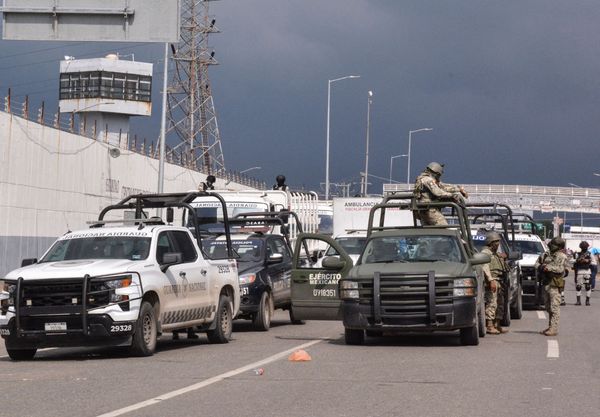
There was a general “I told you so” attitude among Qantas pilots and engineers after the engine failure of a 19-year-old Boeing 737 during take-off in Sydney last Friday. Pilots successfully landed the aircraft, but the accident resulted in a grassfire at Sydney Airport. Luckily, no passengers, crew or ground staff were injured.
According to Qantas engineers and pilots who spoke to Crikey, the failure of an engine only weeks away from its “life limit” resulted in the immediate grounding of at least two more aircraft with similarly old engines. Qantas, remarkably, does not have any spare engines. So to fix the issue, Qantas is working around the clock to remove engines from this already damaged aircraft (which was supposed to be flown to Singapore for repairs). This sent ripples through the system, resulting in further cancellations and delays for long-suffering passengers.
According to aircraft-tracking website FlightAware, in the 24 hours from 4pm on Friday, 40% of all Qantas flights were delayed. In the 24 hours from 4pm on Sunday, 18 Qantas flights were cancelled and delays were still running at 21%.
The engine failure was the second major incident on a Qantas flight last week. The one you won’t have read about was the potential crash-landing failure of a twin-aisle A330-200 flying from Melbourne to Perth after a module on the flight deck that controls the landing gear failed after take-off. The problem was eventually managed with some difficulty, Crikey has learned, while former Qantas chair Richard Goyder was said to be on board. Qantas did not respond to further questions about the 737 or the A330.
These are the latest public signs of the increasingly frail state of Qantas’ ageing fleet, a result of former CEO Alan Joyce’s strategy of maximising profits by delaying fleet renewal. Engineers and pilots have been predicting such events for years, with the company continuing Joyce’s money-saving approach with its aircraft and engineering divisions, including scrimping on maintenance staff and inventory. Heavy airline and engine maintenance and reconditioning are now mainly done offshore, including in China.
“We have no spare engines, of course,” an engineer told Crikey. “So one engine will be robbed off another aircraft, which is grounded at the moment with a pickle fork crack awaiting permit to ferry to Singapore to have it replaced.”
“The pickle fork fitting is known to crack in high-cycle airframes [aircraft worked hard by airlines]. It’s a major fail-safe strap at the fuselage. We used to be able to fix those here, but not anymore. None of these things are surprising. They’re simply a sign of old age.”
Look a bit closer and there is plenty more evidence of plane wear. About 50% of Qantas’ fleet of ancient Fokkers used in Western Australia are in such disrepair that several are grounded most days as engineers struggle to keep up with repairs. On October 21, a Fokker on a flight from Perth to Paraburdoo suffered mechanical problems, terrifying passengers and crew. This forced the company to reinstate a B717 that had been retired days earlier.
“We are having a shocking time over here. The aircraft are in a very bad state, lots of grounding and breakdowns every single day,” a pilot from Network Aviation, a Qantas subsidiary, told Crikey.
Qantas insiders said the company lost a group of its most experienced engineers and pilots to Mineral Resources earlier this year for its new in-house airline.
In an email to staff obtained by Crikey, Network Aviation COO Trevor Horgan referred to a wet lease arrangement with rival airline Airnorth. This would see Airnorth cover six Fokker flights during the week for at least a month. This came after both Qantas mainline and Alliance Aviation, a company that Qantas leases aircraft from, declined to convert the services because they did not have enough pilots, Network pilots told Crikey. Qantas has not announced replacements for the 16 Fokker 100s whose average age is 31 years.
”The situation on the Fokkers is so bad that many crew members are wondering if it’s their plane that will crash,” the pilot said.
“Couple that with low manpower and a constant experience drain, without heavy maintenance in Australia [all now outsourced overseas] to bring the few new engineers up to speed. Management just doesn’t get just how much experience it takes to fix jets like this properly.”
Adding to passenger woes, the airline is struggling to staff its new A220s, which are supposed to replace the B717s. This is causing more delays and cancellations, as well as lengthy flights on smaller, slower planes. For example, Qantas announced on October 28, with the usual brouhaha, that it has landed an A200 on the Coffs Harbour-Melbourne route. But the service was cancelled on both days last weekend, each way. Qantas did not answer questions about A220 staffing issues.
With its growing domestic market share, cancelled flights simply play to Qantas’ financial advantage, allowing it to save on fuel and jack up fares on increasingly limited seats. As passengers seethe, shareholders continue to win: the company’s stock price closed at $8.53 yesterday, up a cool 63% in the past 12 months.
Despite this, the federal government appears to have no interest in reining the Limping Old Roo. Chairman’s Lounge anyone?







